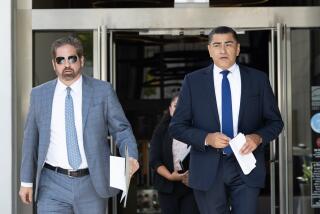Employee Lies Punishable, Justices Say
- Share via
WASHINGTON — Insisting on honesty as the only policy, the Supreme Court ruled Wednesday that public employees can be punished for lying, even when they merely deny an accusation that later turns out to be true.
There is no “right to make false statements,” said Chief Justice William H. Rehnquist. An employee who is asked about possible wrongdoing has only two legal choices: Tell the truth or say nothing, he said.
The 9-0 decision reinstates the sanctions against five federal workers who denied charges that later were proven as true. They included an agency police officer who made harassing phone calls to co-workers, a Defense Department worker who wrongly put $2,000 in personal charges on a government credit card and a nurse at a veteran’s hospital who had a sexual relationship with a patient.
In each instance, the workers denied the charges when they were first asked about them. Sometimes, lying to a supervisor can be deemed worse than the underlying charge.
In each of these cases, the federal employees were given extra punishment because they initially lied to investigators and denied the charges.
But a U.S. appeals court reversed the extra punishment in all five cases, ruling that the Constitution gave public employees a right to deny charges against them. For example, the agency police officer, Lester Erickson, was to be dismissed from his job, but the appeals court reduced the punishment to a 15-day suspension.
In a criminal trial, a defendant has a right to plead not guilty. However, if the defendant takes the witness stand and lies, he or she can be punished separately for perjury.
The “right to testify does not include a right to commit perjury,” the high court said in 1993.
The justices took up the cases of the five federal employees to decide whether the Constitution shields a person from being punished for simply denying an accusation.
The Justice Department urged the court to rule there is no “right to lie” in the Constitution.
In a brief opinion that spoke for all nine justices, the chief justice agreed. “A citizen may decline to answer the question, or answer it honestly, but he cannot with impunity knowingly and willfully answer with a falsehood,” Rehnquist said.
More to Read
Get the L.A. Times Politics newsletter
Deeply reported insights into legislation, politics and policy from Sacramento, Washington and beyond. In your inbox twice per week.
You may occasionally receive promotional content from the Los Angeles Times.











